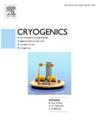Nano aluminum nitride fillers for enhanced mechanical and thermal properties of GFRP in cryogenic temperature settings
IF 1.8
3区 工程技术
Q3 PHYSICS, APPLIED
引用次数: 0
Abstract
Glass fiber-reinforced polymer (GFRP) composites, with epoxy resin or a blend of cyanate and epoxy resins as the matrix, have been used as insulating materials of high-field, large-scale superconducting magnets for accelerators and magnetic confinement fusion. However, the GFRP does not fully meet the requirements for the next generation of magnetic confinement fusion with respect to the mechanical and thermal performance at cryogenic temperature and huge electromagnetic stress. This paper introduces a method for enhancing both the mechanical and thermal properties of the GFRP composites using aluminum nitride (AlN) nanoparticles. The fabrication of the AlN-GFRP composite involved a method that combines “dip absorption” with vacuum-assisted resin transfer molding (VARTM). The dip absorption method was utilized to deposit AlN nanopowders onto glass fibers, resulting in the preparation of AlN-glass fiber layers. Subsequently, the AlN-woven glass fibers were incorporated to reinforce the cyanate ester/epoxy based composites using the VARTM technology. The mechanical and thermal properties of the AlN-GFRP composites were assessed across varying temperatures. The results indicate that the short-beam shear strength (SBS strength) of the AlN-GFRP composites improves at cryogenic temperatures compared to that of the GFRP composites without AlN. Additionally, enhanced thermal conductivities are observed across different temperature ranges for the AlN-GFRP composites. The coefficient of thermal expansion between 77 K and 300 K of the composites significantly decreases with the addition of the AlN nanopowders.
纳米氮化铝填料可增强 GFRP 在低温环境下的机械和热性能
以环氧树脂或氰酸酯与环氧树脂混合物为基体的玻璃纤维增强聚合物(GFRP)复合材料已被用作加速器和磁约束核聚变用高场大型超导磁体的绝缘材料。然而,GFRP 在低温和巨大电磁应力下的机械和热性能并不能完全满足下一代磁约束核聚变的要求。本文介绍了一种利用氮化铝(AlN)纳米颗粒提高 GFRP 复合材料机械性能和热性能的方法。氮化铝-GFRP 复合材料的制造采用了 "浸渍吸收 "与真空辅助树脂传递成型 (VARTM) 相结合的方法。利用浸渍吸收法将 AlN 纳米粉末沉积到玻璃纤维上,从而制备出 AlN 玻璃纤维层。随后,利用 VARTM 技术将 AlN 编织玻璃纤维加入到氰酸酯/环氧基复合材料中进行加固。对 AlN-GFRP 复合材料在不同温度下的机械性能和热性能进行了评估。结果表明,与不添加 AlN 的 GFRP 复合材料相比,AlN-GFRP 复合材料在低温条件下的短梁剪切强度(SBS 强度)有所提高。此外,还观察到 AlN-GFRP 复合材料在不同温度范围内的热导率都有所提高。添加纳米 AlN 粉末后,复合材料在 77 K 至 300 K 之间的热膨胀系数显著降低。
本文章由计算机程序翻译,如有差异,请以英文原文为准。
求助全文
约1分钟内获得全文
求助全文
来源期刊

Cryogenics
物理-热力学
CiteScore
3.80
自引率
9.50%
发文量
0
审稿时长
2.1 months
期刊介绍:
Cryogenics is the world''s leading journal focusing on all aspects of cryoengineering and cryogenics. Papers published in Cryogenics cover a wide variety of subjects in low temperature engineering and research. Among the areas covered are:
- Applications of superconductivity: magnets, electronics, devices
- Superconductors and their properties
- Properties of materials: metals, alloys, composites, polymers, insulations
- New applications of cryogenic technology to processes, devices, machinery
- Refrigeration and liquefaction technology
- Thermodynamics
- Fluid properties and fluid mechanics
- Heat transfer
- Thermometry and measurement science
- Cryogenics in medicine
- Cryoelectronics
 求助内容:
求助内容: 应助结果提醒方式:
应助结果提醒方式:


